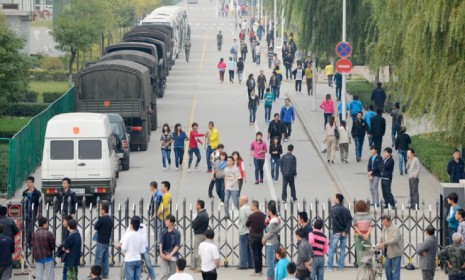What the Foxconn riot tells us about China
More than 2,000 angry workers take to the streets, and 5,000 police officers are needed to put the riot down. Is a growing wave of labor unrest a sign that China is in trouble?

A free daily email with the biggest news stories of the day – and the best features from TheWeek.com
You are now subscribed
Your newsletter sign-up was successful
Foxconn, a company most famous for building Apple's iPhones and other iGoodies, but also responsible for assembling lots of other tech wonders, encountered an unwelcome controversy this weekend when 2,000 workers rioted, requiring the government to dispatch 5,000 armed officers. (Watch amateur video footage of the riot below.) In the end, 40 people were hospitalized, several workers were arrested, and Foxconn shut down the factory to give everyone a chance to cool down. The riot is only the latest in a string of woes for Foxconn, which faced scrutiny after a riot at another plant in June. What does this growing unrest tell us about Foxconn, and the evolving state of business and labor in China? Here, three theories:
1. China's labor unrest remains murky
We don't know for sure what caused the riot, says Mark Memmott at NPR. Authorities are calling it a "personal dispute" between workers, but employees have used social media to complain that the riot was sparked by long-running tensions, created in part by daily security checks to prove employees aren't stealing products and "allegations that security guards constantly push around the workers and in some cases have even beaten them."
The Week
Escape your echo chamber. Get the facts behind the news, plus analysis from multiple perspectives.

Sign up for The Week's Free Newsletters
From our morning news briefing to a weekly Good News Newsletter, get the best of The Week delivered directly to your inbox.
From our morning news briefing to a weekly Good News Newsletter, get the best of The Week delivered directly to your inbox.
2. But the problems are clearly bigger than a single dispute
The cause of this fight is indeed murky, but we can make some educated guesses, says Paul Mozur at The Wall Street Journal. It's almost certainly rooted in the problems that have plagued Foxconn — and other massive Chinese corporations — for months: An increasingly vocal labor force seeking higher wages, shorter hours, and better treatment. The growing stress of the tension between China's working and corporate classes means that it doesn't take much to "make a situation like this explode."
3. And Chinese workers may try to band together
"China isn't just going to have another 25 years like the last 25 years," says Matthew Yglesias at Slate. Rapid industrialization has meant that increases in productivity have outpaced increases in wages, creating "a dynamic ripe for windfall profits but also for labor activism." Still, the Chinese government has done its best to create "an unpromising ground for union organizing." Then again, without union-managed pension funds and union-owned buildings, Chinese labor organizations have a lot less to lose if they strike.
A free daily email with the biggest news stories of the day – and the best features from TheWeek.com